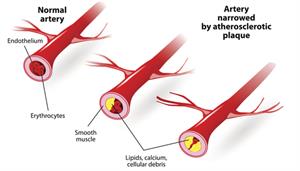 A coronary artery calcium (CAC) score is a method for determining risk of heart disease and making appropriate treatment recommendations. This non-invasive computed tomography (CT) scan measures the calcium within the plaques in the coronary artery walls.
A coronary artery calcium (CAC) score is a method for determining risk of heart disease and making appropriate treatment recommendations. This non-invasive computed tomography (CT) scan measures the calcium within the plaques in the coronary artery walls.
The results provides a CAC score that has been validated in numerous trials involving hundreds of thousands of individuals. The CAC scan measures the age of the coronary arteries. In other words, a 50 year-old diabetic man can have 80 year-old coronary arteries, while a 75 year-old woman with no risk factors can have 45 year-old coronary arteries. The CAC score is interpreted based on age, sex, and ethnicity to determine one’s risk of having a heart attack or dying from coronary artery disease (CAD) over the next 10 years.
WHY IS A CALCIUM SCORING HEART CT TEST PERFORMED?
This non-invasive test is a more sophisticated method to determine the risk of CAD. Calcium scoring is a better predictor of heart disease than cholesterol screening or monitoring other risk factors.
IS CAC SCORING RIGHT FOR YOU?
Not everyone needs a CAC scan. The following table describes who might benefit from it:
| CAC may be helpful |
CAC is not helpful |
| No symptoms of CAD |
Symptoms of CAD |
| Age 45-75 years of age |
Age <40 and >85 years |
| Intermediate (medium) CAD risk |
Very low or very high CAD risk* |
| No known CAD* |
Known CAD* |
*previous heart attack, angioplasty, stent or bypass surgery
WHO PERFORMS THE Test?
The test is performed by a CT technologist and is read by an imaging cardiologist or a radiologist.
WHAT HAPPENS DURING THE Test?
You will lie on your back on the CT table and EKG electrodes will be placed on your chest to monitor your heart rate. The CT table will move in very small increments every few seconds and take pictures. You will be asked to hold your breath for a moment and hold perfectly still. You will be left alone in the room; however, the technologist will watch you through a window and you will be able to speak to him or her.
HOW LONG IS THE PROCEDURE?
The scan itself takes approximately 30 seconds; however, the entire procedure takes approximately 10 to 15 minutes from start to finish.
WHAT DO MY RESULTS MEAN?
An ideal calcium score is zero, which is associated with excellent long-term outcomes or freedom from heart disease. Increasing CAC scores are associated with progressively worse outcomes. Practically speaking, a CAC score gives doctors the tools to know what exactly is going on in the coronary arteries and what must be done to prevent a heart attack or stroke.
DOES INSURANCE COVER THE COST OF THE TEST?
No, insurance does not cover the cost of this test. A physician’s order is required.
WHAT PRECAUTIONS ARE THERE?
This test is meant for people without symptoms suggestive of heart disease, including chest pain or discomfort, shortness of breath or palpitations (heart pounding or fluttering). If you are having any of the above symptoms, please call your doctor.
The results from your calcium score test will be sent to your doctor. After a calcium scoring test, it is important to have routine follow-up appointments with your doctor as this test is not an absolute test in predicting your risk for heart attack.
CAC scan involves a small amount of radiation to the chest. It does not require a dye contrast and has a very low radiation dose of 1–2 mSv compared to a chest X-ray of 0.05 mSv.